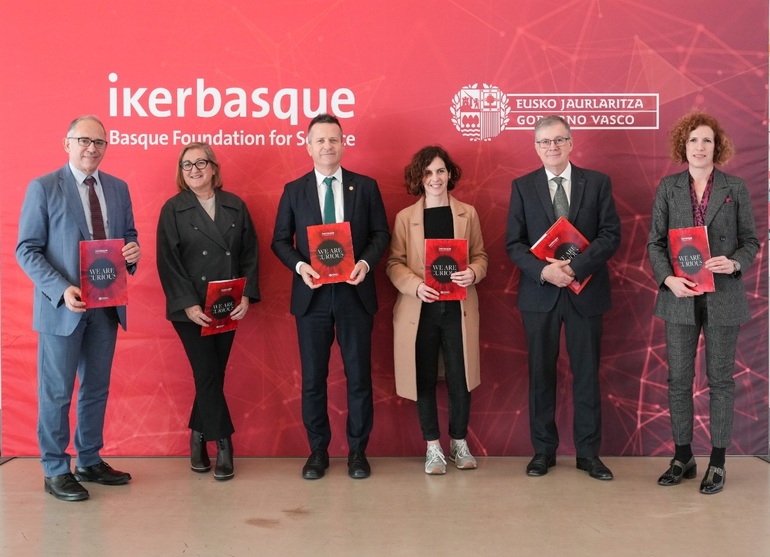
At the end of 2022, Ikerbasque had a total of 178 researchers with extensive research experience and leadership capacity, 94 young researchers with whom it intends to promote a pool of high-level young researchers, and 73 Research Associates, a category that complements the two previous ones and that seeks to cover the different stages of the research career. Their research work had a notable reflection in scientific publications; Throughout the year they published a total of 1,437 documents in indexed publications, that is, in highly qualified editorial media on an international scale. Although this data is slightly lower than the figure reached in 2021, it is worth mentioning that scientific production has stabilized after the pandemic period, which led to an inflation of scientific production worldwide in 2021.
The total number of funds obtained by Ikerbasque researchers during 2022 amounted to 40,361,528 euros (almost 3 million more than in 2021). Since 2007 they have brought a total of 335 million euros to the Basque Country. Out of a total of 1,058 projects (118 projects more than the previous year) that had external funding, twenty had funding from the ERC (European Research Council), the most prestigious institution on the old continent in terms of research, promoting ambitious research projects at the frontiers of knowledge. At the end of last year, 1,593 people worked in the groups led by these researchers. Likewise, researchers have participated in the creation of 35 spin-offs, business initiatives that are characterized by basing their activity on the exploitation of new processes, products or services based on the knowledge and results obtained in their research.
The people recruited by IKERBASQUE around the world to carry out their work in universities and R&D centers in the Basque Country come from 35 countries and are mostly men, 73% compared to 27% women. In relation to their area of knowledge, 49% are specialists in experimental sciences, 23% in medical sciences, 15% in engineering and 13% in social sciences and humanities. The Ikerbasque researchers come from the most prestigious centers worldwide such as the MIT, Harvard University, Oxford, Stanford, CNRS or Max Planck.
The results obtained in 2022 allow us to affirm that the Basque Country is positioned as a European benchmark in science; We are already internationally recognized as a region with advanced research, with Basque research groups of international level and where the right conditions exist to carry out research of international stature. Proof of this is that in 2021 the European Commission chose Ikerbasque's program to attract researchers as one of the best European initiatives for scientific development. Ikerbasque's proposal obtained the highest score among the 148 proposals evaluated, which means 4 million euros to Ikerbasque for the hiring of 36 new researchers in the Basque Country over the next 4 years.
Some outstanding works
Among the works carried out by IKERBASQUE researchers and the outstanding publications over the last year, the following can be highlighted:
- A supernova in distant space allows us to understand the origin of the elements of the universe. The discovery, in which Tom Broadhurst (UPV/EHU Ikerbasque Researcher and DIPC associate) participated, was made possible through images captured by the Hubble Space Telescope. The results of the research were published in the prestigious journal Nature.
- A work led by Arkaitz Carracedo, an Ikerbasque researcher at CICbioGUNE, showed that blood vessels are central players in the development of obesity. The research revealed a mechanism by which vessel cells instruct fat cells. The work was published in the journal Nature Metabolism.
- An article published in The Journal of Clinical Investigation by the group of Maria Muñoz Caffarel, Ikerbasque Researcher at Biodonostia, showed that the proinflammatory cytokine Oncostatin M (OSM) favors the progression and metastasis of breast cancer, acting as a messenger in the tumor microenvironment. According to the research results, tumors with high levels of OSM are associated with a worse prognosis in patients. This finding may lead to the development of new therapeutic strategies for breast cancer.
Host center
Regarding their destinations, 124 Ikerbasque researchers have been attached to the UPV/EHU. The remaining 221 have joined the rest of the Universities (Deusto and Mondragon Unibertsitatea) and research centers, including the nine BERC (Basque Excellence Research Center) from the Department of Education.
The full list of existing BERCs is as follows:
- Achucarro – Basque Center for Neuroscience
- BC3 - Basque Center for Climate Change
- BCAM - Basque Center for Applied Mathematics (Bilbao)
- BCBL - Basque Center on Cognition, Brain and Language (Donostia)
- BCMaterials- Basque Center for Materials, Applications and Nanostructures
- Biofisika Institute. Basque Center for Biophysics of Bizkaia (Leioa)
- CFM-MPC Materials Physics Center (Donostia)
- DIPC - Donostia International Physics Center (Donostia)
- Polymat – Basque Center for Macromolecular Design & Engineering (Donostia)
In addition to these nine centers of excellence and the three aforementioned universities (UPV/EHU, Deusto and Mondragon), among the recipients of the researchers contracted by IKERBASQUE are also the Cooperative Research Centers (CIC) biomaGUNE (biomaterials), bioGUNE (biosciences ), energiGUNE (energy) and nanoGUNE (nanosciences), as well as the Biodonostia and Biocruces health research institutes, and the Azti, Neiker, Tecnalia and Tecnun research centers (University of Navarra) as well as Globernance (center for research and dissemination of political thought) and the IISL/IISJ (International Institute of Legal Sociology of Oñati). In total, 24 Basque universities and research centers benefit from attracting international researchers.
.png)
